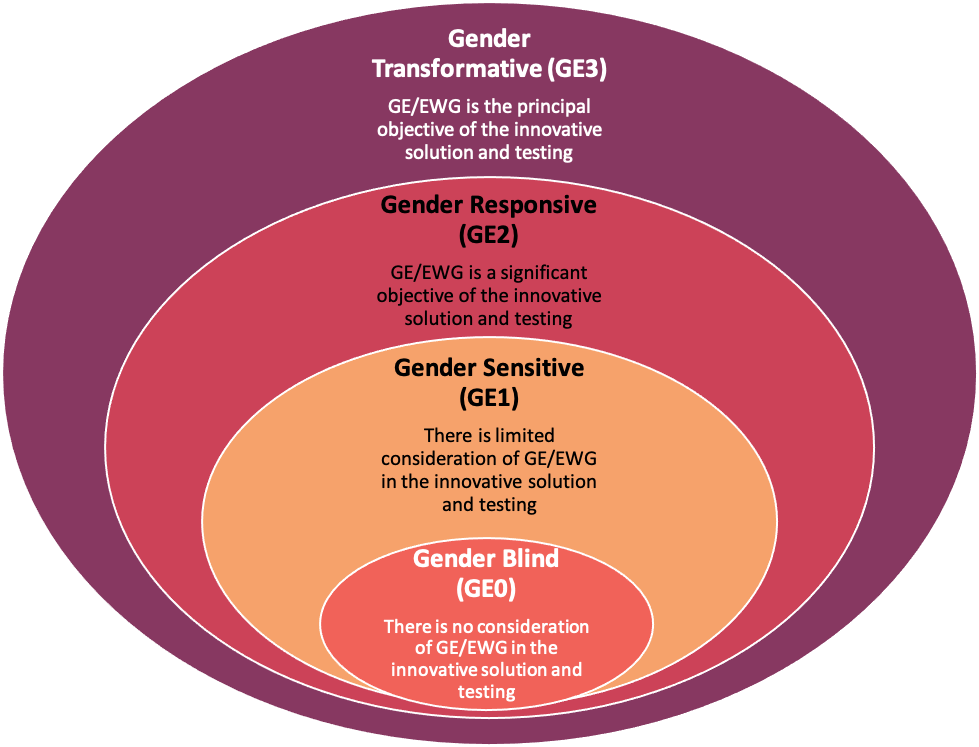Gender Equality
FIT aims to advance gender equality (GE) in the Global South by supporting the testing of innovative solutions that are gender-responsive and seek to empower women, girls and vulnerable communities.
Guided by Canada’s Feminist International Assistance Policy and the Whistler Principles to Accelerate Innovation for Development Impact, FIT recognizes that promoting gender equality is not only a crucial human rights issue, but also a pre-condition for inclusive and sustainable development.
A key goal of FIT is to foster greater understanding of the links between gender equality and innovation by sharing useful resources with Canadian SMOs who want to test and learn from innovative approaches to address development challenges.
Some of the questions FIT aims to explore throughout the program include: How can a gender-based approach be incorporated throughout an innovation process from design to execution and evaluation? How can local beneficiaries/participants, especially women and girls, participate meaningfully in the co-creation of an innovative idea? How can we identify and measure the impacts of a solution to gender equality?
We encourage you to return to this page regularly for new information and resources.
What is GE?
Gender equality (GE) is achieved when women and men, girls and boys, and people of all genders enjoy equal rights, responsibilities and opportunities, and have the power to shape their own lives, participate fully in all spheres of society, and contribute to an inclusive and democratic society.
GE is not only a women’s or girl’s issue – it involves women, girls, men and boys. A gender-equal society ensures fair and equitable distribution of power, influence and resources in society, and makes use of every individual’s experiences, skills and competencies.
FIT recognizes the diversity within groups of people of all genders with the understanding that individuals may be impacted differently by social and cultural factors, and/or development projects.
Canada's FIAP
Canada’s Feminist International Assistance Policy defines key action areas to promote a common vision and ensure the effectiveness of international assistance provided by Canadian organizations in the Global South.
FIAP’s core action is gender equality and the empowerment of women and girls.
Other action areas include:
- Human dignity,
- Growth that works for everyone,
- Environment and climate action,
- Inclusive governance
- Peace, and security.
GE should be integrated throughout all action areas pertinent to your testing.
Empowerment of Women and Girls
Empowering women, girls and other genders is a crucial step on the path to gender equality. Through empowerment, women become more aware of unequal power relations, gain control over their lives, and build the confidence and skills needed to overcome inequality in their homes, workplaces and communities.
The desire for empowerment should not come from outside: only women can empower themselves to make choices or to speak out on their own behalf.
Innovative projects should find new ways to support women as they increase their self-confidence, develop self-reliance, make decisions and set their own agendas.
The empowerment of women and girls is shaped by the following factors:
- Agency: the capacity for women and girls to take purposeful action and pursue goals, free from the threat of violence or retribution.
- Resources:
- Tangible Resources – such as money, funding, credit, jobs, land, tools, equipment, fertilizer, water and other natural resources, etc., and
- Intangible resources – time, safety, wellbeing, political networks, credibility, self-confidence, creativity, organization, etc. that women and girls have, own, or use individually or collectively to exercise agency
- Structures: Institutional structures or social arrangements, including both formal and informal rules and practices, that shape and influence women and girls' ability to express agency and assert control over resources, which include the spheres of the family, community, market, and state.
FIT’s Gender Equality Markers
FIT’s Gender Equality Markers (GEMs) measure the extent to which an innovative solution expects to contribute to advancing gender equality and empowering women and girls through testing activities in the Global South.
FIT developed this tool to guide SMOs throughout the design and testing stage of an innovation to ensure that the intervention effectively addresses gender issues. Ideally, innovative solutions will not only take gender into account, but also, if possible, actively attempt to address and transform the root causes of gender inequality.

More GEM Info (PDF 3.38MB)
Prevention of Sexual Exploitation and Abuse
FIT places human rights and dignity at the centre of our work. As such, we are committed to establishing a culture of zero tolerance for sexual exploitation, harassment and abuse which could occur during the testing of innovative solutions.
Each funded SMO must have its own Prevention of Sexual Exploitation and Abuse (PSEA) Policy and/or Code of Conduct, and ensure that their local partners are equally committed to preventing sexual exploitation and abuse.
FIT Requirements
Requirement 1
The policy or code of conduct shall be integrated across the SMO’s operations and shall, at a minimum, include the following provisions:
- Accountability processes, including roles and responsibilities to ensure monitoring of, and compliance with, the policy or code of conduct;
- A mechanism for anonymous and confidential reporting and, fair and confidential investigative procedures to respond to all allegations of sexual exploitation and abuse;
- Training on prevention of sexual exploitation and abuse and remedial measures when misconduct is found
Requirement 2
The SMO shall provide a written copy of its policy or Code of Conduct to all staff, local partners and program beneficiaries, and promote the protection from sexual exploitation and abuse. The SMO shall ensure that local partners and program beneficiaries either:
- Sign an attestation stating they will respect the SMO’s policy or code of conduct, or
- Adopt their own policies and procedures to prevent sexual exploitation and abuse in keeping with the goals and objectives of the SMO’s policy or code of conduct.

